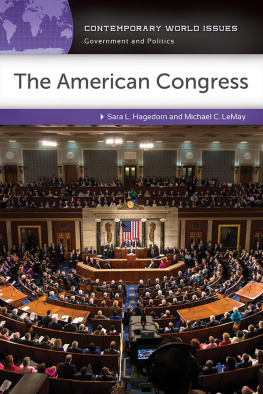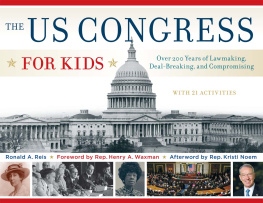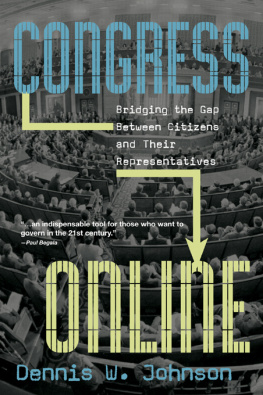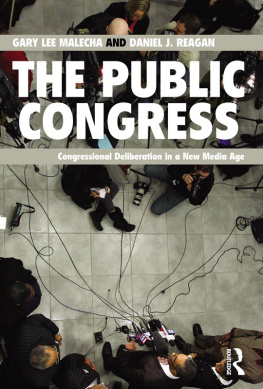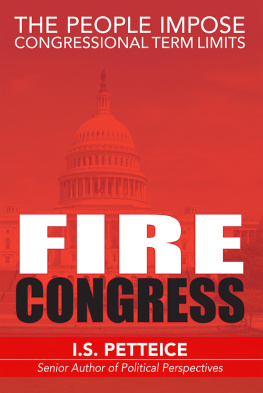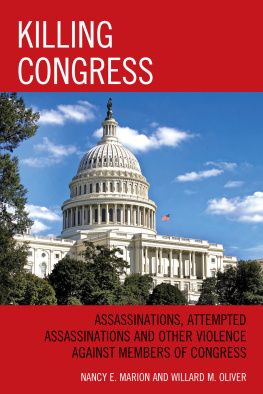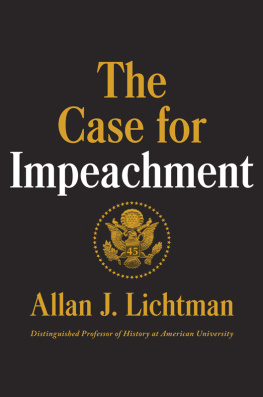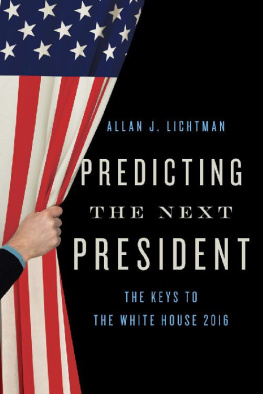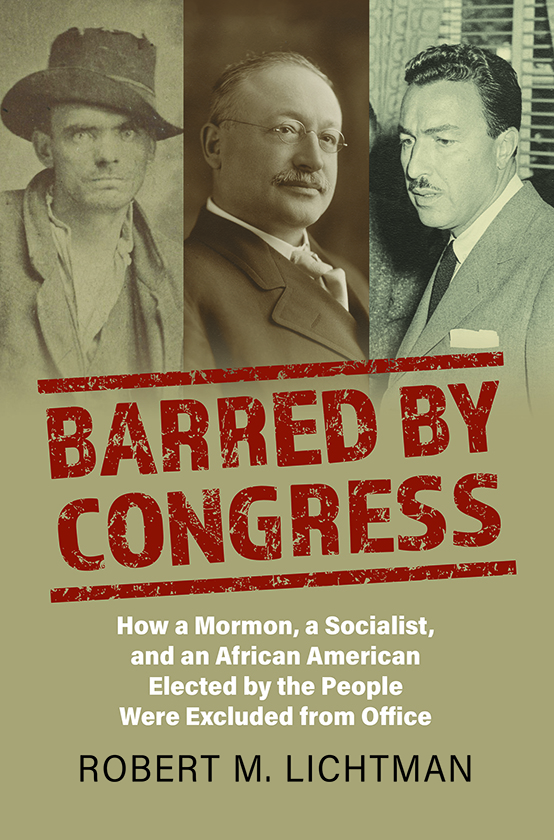Table of Contents
barred by congress
barred by congress
How a Mormon, a Socialist, and an African American Elected by the People Were Excluded from Office
robert m. lichtman

University Press of Kansas
2022 by the University Press of Kansas
All rights reserved
Published by the University Press of Kansas (Lawrence, Kansas 66045), which was organized by the Kansas Board of Regents and is operated and funded by Emporia State University, Fort Hays State University, Kansas State University, Pittsburg State University, the University of Kansas, and Wichita State University
Library of Congress Cataloging-in-Publication Data
Names: Lichtman, Robert M., 1933 author.
Title: Barred by Congress : how a Mormon, a socialist, and an African
American elected by the people were excluded from office / Robert M.
Lichtman.
Description: Lawrence : University Press of Kansas, 2021 | Includes
bibliographical references and index.
Identifiers: LCCN 2021012545 (print) | LCCN 2021012546 (ebook)
ISBN 9780700632725 (cloth)
ISBN 9780700632732 (ebook)
Subjects: LCSH: United States. HouseExpulsionHistory20th century. |
African American legislatorsLegal status, laws, etc.History20th
century. | MormonsPolitical activitiesUnited StatesHistory20th
century. | SocialistsPolitical activityUnited StatesHistory20th
century.
Classification: LCC KF4990 .L53 2021 (print) | LCC KF4990 (ebook) | DDC
328.73/073dc23
LC record available at https://lccn.loc.gov/2021012545
LC ebook record available at https://lccn.loc.gov/2021012546.
British Library Cataloguing-in-Publication Data is available.
Printed in the United States of America
10 9 8 7 6 5 4 3 2 1
The paper used in the print publication is acid free and meets the minimum requirements of the American National Standard for Permanence of Paper for Printed Library Materials Z39.48-1992.
In memory of the Founders, the improbable handful of geniuses whose vision of American democracy has survived more than two and one-quarter centuries but is still, we have learned, by no means a given.
The true principle of a republic is, that the people should choose whom they please to govern them.... This great source of free government, popular election, should be perfectly pure, and the most unbounded liberty allowed.
Alexander Hamilton, Debates in the Convention of the State of New York on the Adoption of the Federal Constitution
Contents
preface
In January 1967, as a young lawyer working at a Washington, DC, law firm, I was asked by a senior colleague, William A. Geoghegan, whether I would join him as counsel to a special committee of the House of Representatives whose job was to advise the House on the seating of representative-elect Adam Clayton Powell Jr. The committees chairman had chosen Geoghegan to be chief counsel to the committeeI was to help out. Of course, I accepted. Not only was Powell, the congressman from Harlem, a flamboyant and controversial public figure, always front-page news, but also the widespread demands that the House deny him the seat to which he had been elected by the voters posed serious constitutional issues.
My work for the committee was brief but memorable, and I always assumed I would write about it. But trapped in a high-pressure law practice, I allowed decades to pass. When I finally began to write, I discovered that the two members-elect excluded from the House immediately prior to PowellVictor L. Berger, a Socialist Party leader and editor of an anti-war Milwaukee newspaper, excluded in 1919 and again in 1920 for alleged disloyalty during World War I; and B. H. Roberts, a Utah Mormon excluded in 1900 in large measure for polygamywere equally remarkable and controversial figures and that their cases had close and unexpected parallels to Powells.
A book that thus began, somewhat narrowly, as an account of Powells exclusion and an analysis of the constitutional issues posed by it expanded to cover the exclusions of two other members-elect, disparate individuals in different time periods. It also became concerned with the lives of all three individuals and with the religious and racial bigotry and the hostile political forces that led to their exclusions and, ultimately, to a historic Supreme Court decision.
I am grateful to professors Norman Abrams, Aziz Huq, and Marc S. Galanter; judges Timothy B. Dyk and Thomas A. Balmer; and George Avery and Stephen Weissman, each of whom undertook to read my manuscript (or portions of it) and to offer perceptive comment and encouragement. I owe a debt of gratitude to the archivists and librarians at the San Francisco Public Library (particularly Janice Torbet and her colleagues at the Government Information Center), the Library of Congress, Manuscript Division (and its chief Jeff Flannery), and the La Guardia and Wagner Archives, La Guardia Community College (and Richard Lieberman). Valuable assistance was provided by Edgar S. and Jonathan Cahn, Thom D. Roberts, Judith Lichtman, Dashiell Harrison, E. Jeffrey Banchero, and Jacob Bronstein. I am grateful to David Congdon of the University Press of Kansas for his consistent support and useful advice. And I owe a special debt of gratitude to my family, particularly Margaret Mak and James Rieck, and friends for their patience with me during the years I spent writing this book.
prologue: The Constitution and the Congress
house excludes powell, the New York Times headlined on March 2, 1967, its extra-large print signaling an event of unusual significance. Adam Clayton Powell Jr., the representative-elect from New Yorks Eighteenth Congressional District (in upper Manhattan, largely Harlem), had been a House member for twenty-two years and, during that time, a relentless advocate for the rights and interests of African Americans. For six years he had been chairman of a major House committee, the Education and Labor Committee, until he was stripped of his chair on January 9, 1967, by the Democratic caucus. Exclusion meant that Powell was now, at the outset of a new Congress, barred by a majority vote of the House from taking the oath of office and assuming his House seat.
Powelleveryone called him Adam; he titled his autobiography Adam by Adam was not present at the Capitol or even in Washington, DC, when the House voted to exclude him. Rather, he was in Bimini, a cluster of tiny islands in the Bahamas, where he maintained a house and a boat he named Adams Fancy . He spent the morning fishing and the afternoon at the End of the World, a ramshackle bar, playing dominoes with friends, United Press International (UPI) reported , and sipping Scotch whiskey and milk. About four oclock, he walked to Biminis only telephone and made a twenty-minute phone call to Washington. Whether excluded or not, he told a reporter afterward, Ill be happy all the time. But in an earlier interview he said that his exclusion would be tantamount to a second Dred Scott decision.
The charges of misconduct against Powell were aptly characterized by Representative Bob Eckhardt, a Texas Democrat, as many peccadillos. As found by the Select Committee appointed by the Speakerfindings embodied in a House resolutionPowell had been held in contempt by New York state courts, thereby reflecting discredit upon the House (this in a defamation action brought by a constituent whom he had called, apparently accurately, a bag lady for police officials collecting bribe money from gamblers); he improperly put his wife on the government payroll; he permitted improper expenditures of government funds for private purposes (modest amounts spent on airline tickets); and he refused to cooperate with the Select Committee and an earlier investigating committee.


